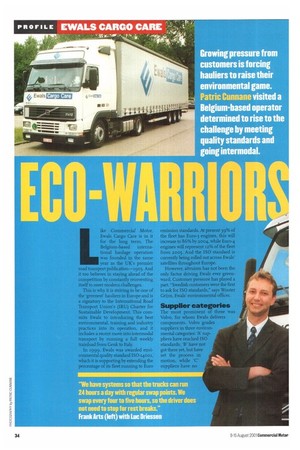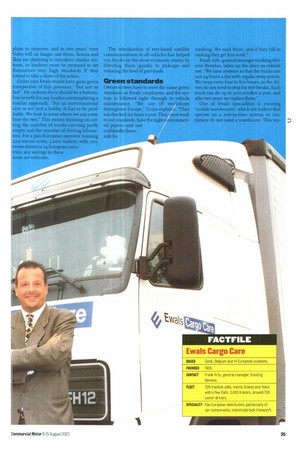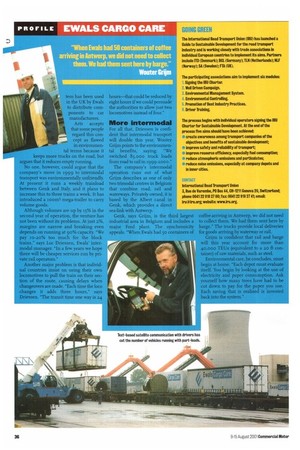ike Commercial Motor, Ewals Cargo Care is in it for
Page 34

Page 35

Page 36

If you've noticed an error in this article please click here to report it so we can fix it.
the long term. The Belgium-based international haulage operation was founded in the same year as the UK's premier
road transport pub1ication-1905. And it too believes in staying ahead of the competition by constantly reinventing itself to meet modern challenges.
This is why it is striving to be one of the 'greenest' hauliers in Europe and is a signatory to the International Road Transport Union's (IRU) Charter for Sustainable Development. This commits Ewals to introducing the best environmental, training and industry practices into its operation, and it includes a recent move into intermodal transport by running a full weekly trainload from Genk to Italy.
In 1999, Ewals was awarded environmental quality standard ISO-moor, which it is supporting by extending the percentage ofairkunningliak
emissiOn n . t present 39% of the fleet has Euro-3 engines, this will
increase to 86% by 2004,0 while Euro-4 engines will represent 12% of the fleet from 2005. And the ISO standard is currently being rolled out across Ewals' satellites throughout Europe.
However, altruism has not been the only factor driving Ewals ever greenward. Customer pressure has played a part. "Swedish customers were the first to ask for ISO standards," says Wouter G ri j m, Ewals' environmental officer.
Supplier categories
The most prominent of these was Volvo, for whom Ewals delivers components. Volvo grades suppliers in three environmental categories: 'A' suppliers have reached ISO standards, 'B have not got there yet, but have set the process in motion, while 'C suppliers have no plans to improve, and in two years' time Volvo will no longer use them. Scania and Ikea are planning to introduce similar systems, so hauliers must be prepared to set themselves very high standards if they intend to take a share of the action.
Grijm says Ewals would have gone green irrespective of this pressure, "but not so fast". He reckons there should be a bottomline benefit for any haulier contemplating a similar approach. "For us environmental care is not just a hobby. It has to be profitable. We look to areas where we can combine the two." This means focusing on cutting the number of trucks running partly empty and the number of driving kilometres. For a pan-European operator running 220 tractor units, 3,000 trailers, with 700 owner-drivers in i4 European countries, any savings in these
areas are welcome.
The introduction of text-based satellite communications to all vehicles has helped run trucks on the most economic routes by diverting them quickly to pick-ups and reducing the level of part-loads.
Green standards Owner-drivers have to meet the same green standards as Ewals' employees, and the system is followed right through to hick maintenance. "We use 18 ups ley work nmen maintenance. "We use 18 ups ley work nmen throughout Europe," Grijm are checked six times a year, to our standards, have the right tal papers and use ecofriendly chemicals for
washing. We rank them, and if they fall in ranking they get less work.'
Frank Arts, general manager trucking division Benelux, takes up the story on vehicle use. "We have systems so that the trucks can run 24 hours a day with regular swap points. We swap every Four to five hours, so the drivers do not need to stop for rest breaks. Each truck can do up to 200,000km a year, and after two years we replace them."
One of Ewals specialities is running 'mobile warehouses', which are trailers that operate on a just-in-time system so customers do not need a warehouse, This sys tern has been used in the UK by Ewals
to distribute components to car manufacturers.
Arts accepts that some people regard this con cept as flawed in environmental terms because it keeps more trucks on the road, but argues that it reduces empty running.
No one, however, could argue that the company's move in 1999 to intermodal transport was environmentally unfriendly.
At present it runs a weekly trainload between Genk and Italy, and it plans to increase this to three trains a week. It has introduced a room3 mega-trailer to carry volume goods.
Although volumes are up by 15% in the second year of operation, the venture has not been without its problems. At just 2%, margins are narrow and breaking even depends on running at 90% capacity. "We pay 10-20% too much for the block trains," says Luc Driessen, Ewals' intermodal manager. "In a few years we hope there will be cheaper services run by private rail operators."
Another major problem is that individual countries insist on using their own locomotives to pull the train on their section of the route, causing delays when changeovers are made. "Each time the loco changes it adds three hours," says Driessen, The transit time one way is 24
hours—that could be reduced by eight hours if we could persua • the authorities to allow just two locomotives instead of four."
More intermodal
For all that, Driessen is confident that intermodal transport will double this year. Wouter Grijm points to the environrnen tal benefits, saying: "W switched 85,000 truck loa From road to rail in 1999-2000.
The company's interrnod operation runs out of wha Grijm describes as one of on.1two trimodal centres in Be'gni that combine road, rail an waterways. Privately owned, it based by the Albert canal in Genk, which provides a direct sea-link with Antwerp.
Genk, says Grijm, is the third largest industrial area in Belgium and includes a major Ford plant. The synchronicity appeals, "When Ewals had 50 containers of
coffee arriving in Antwerp, we did not need to collect them. We had them sent here by barge." The trucks provide local deliveries for goods arriving by waterway or rail.
Grijm is confident that rail and barge will this year account for more than 40,000 TEUs (equivalent to a 20 ft container) of raw materials, such as steel.
Environmental care, he concludes, must begin at home. "Each depot must evaluate itself. You begin by looking at the use of• electricity arid paper consumption. Ask yourself how many trees have had to be cut down to pay for the paper you use. Each saving that is realised is invested back into the system."




























































































































